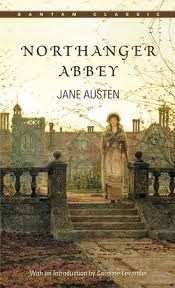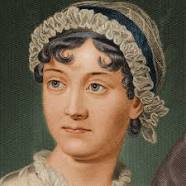Northanger Abbey Page #12
Northanger Abbey was the first of Jane Austen's novels to be completed for publication, in 1803. However, it was not published until after her death in 1817, along with another novel of hers, Persuasion.
The two dances were scarcely concluded before Catherine found her arm gently seized by her faithful Isabella, who in great spirits exclaimed, “At last I have got you. My dearest creature, I have been looking for you this hour. What could induce you to come into this set, when you knew I was in the other? I have been quite wretched without you.” “My dear Isabella, how was it possible for me to get at you? I could not even see where you were.” “So I told your brother all the time--but he would not believe me. Do go and see for her, Mr. Morland, said I--but all in vain--he would not stir an inch. Was not it so, Mr. Morland? But you men are all so immoderately lazy! I have been scolding him to such a degree, my dear Catherine, you would be quite amazed. You know I never stand upon ceremony with such people.” “Look at that young lady with the white beads round her head,” whispered Catherine, detaching her friend from James. “It is Mr. Tilney's sister.” “Oh! Heavens! You don't say so! Let me look at her this moment. What a delightful girl! I never saw anything half so beautiful! But where is her all-conquering brother? Is he in the room? Point him out to me this instant, if he is. I die to see him. Mr. Morland, you are not to listen. We are not talking about you.” “But what is all this whispering about? What is going on?” “There now, I knew how it would be. You men have such restless curiosity! Talk of the curiosity of women, indeed! 'Tis nothing. But be satisfied, for you are not to know anything at all of the matter.” “And is that likely to satisfy me, do you think?” “Well, I declare I never knew anything like you. What can it signify to you, what we are talking of. Perhaps we are talking about you; therefore I would advise you not to listen, or you may happen to hear something not very agreeable.” In this commonplace chatter, which lasted some time, the original subject seemed entirely forgotten; and though Catherine was very well pleased to have it dropped for a while, she could not avoid a little suspicion at the total suspension of all Isabella's impatient desire to see Mr. Tilney. When the orchestra struck up a fresh dance, James would have led his fair partner away, but she resisted. “I tell you, Mr. Morland,” she cried, “I would not do such a thing for all the world. How can you be so teasing; only conceive, my dear Catherine, what your brother wants me to do. He wants me to dance with him again, though I tell him that it is a most improper thing, and entirely against the rules. It would make us the talk of the place, if we were not to change partners.” “Upon my honour,” said James, “in these public assemblies, it is as often done as not.” “Nonsense, how can you say so? But when you men have a point to carry, you never stick at anything. My sweet Catherine, do support me; persuade your brother how impossible it is. Tell him that it would quite shock you to see me do such a thing; now would not it?” “No, not at all; but if you think it wrong, you had much better change.” “There,” cried Isabella, “you hear what your sister says, and yet you will not mind her. Well, remember that it is not my fault, if we set all the old ladies in Bath in a bustle. Come along, my dearest Catherine, for heaven's sake, and stand by me.” And off they went, to regain their former place. John Thorpe, in the meanwhile, had walked away; and Catherine, ever willing to give Mr. Tilney an opportunity of repeating the agreeable request which had already flattered her once, made her way to Mrs. Allen and Mrs. Thorpe as fast as she could, in the hope of finding him still with them--a hope which, when it proved to be fruitless, she felt to have been highly unreasonable. “Well, my dear,” said Mrs. Thorpe, impatient for praise of her son, “I hope you have had an agreeable partner.” “Very agreeable, madam.” “I am glad of it. John has charming spirits, has not he?” “Did you meet Mr. Tilney, my dear?” said Mrs. Allen. “No, where is he?” “He was with us just now, and said he was so tired of lounging about, that he was resolved to go and dance; so I thought perhaps he would ask you, if he met with you.” “Where can he be?” said Catherine, looking round; but she had not looked round long before she saw him leading a young lady to the dance. “Ah! He has got a partner; I wish he had asked you,” said Mrs. Allen; and after a short silence, she added, “he is a very agreeable young man.” “Indeed he is, Mrs. Allen,” said Mrs. Thorpe, smiling complacently; “I must say it, though I am his mother, that there is not a more agreeable young man in the world.” This inapplicable answer might have been too much for the comprehension of many; but it did not puzzle Mrs. Allen, for after only a moment's consideration, she said, in a whisper to Catherine, “I dare say she thought I was speaking of her son.” Catherine was disappointed and vexed. She seemed to have missed by so little the very object she had had in view; and this persuasion did not incline her to a very gracious reply, when John Thorpe came up to her soon afterwards and said, “Well, Miss Morland, I suppose you and I are to stand up and jig it together again.” “Oh, no; I am much obliged to you, our two dances are over; and, besides, I am tired, and do not mean to dance any more.” “Do not you? Then let us walk about and quiz people. Come along with me, and I will show you the four greatest quizzers in the room; my two younger sisters and their partners. I have been laughing at them this half hour.” Again Catherine excused herself; and at last he walked off to quiz his sisters by himself. The rest of the evening she found very dull; Mr. Tilney was drawn away from their party at tea, to attend that of his partner; Miss Tilney, though belonging to it, did not sit near her, and James and Isabella were so much engaged in conversing together that the latter had no leisure to bestow more on her friend than one smile, one squeeze, and one “dearest Catherine.” CHAPTER 9 The progress of Catherine's unhappiness from the events of the evening was as follows. It appeared first in a general dissatisfaction with everybody about her, while she remained in the rooms, which speedily brought on considerable weariness and a violent desire to go home. This, on arriving in Pulteney Street, took the direction of extraordinary hunger, and when that was appeased, changed into an earnest longing to be in bed; such was the extreme point of her distress; for when there she immediately fell into a sound sleep which lasted nine hours, and from which she awoke perfectly revived, in excellent spirits, with fresh hopes and fresh schemes. The first wish of her heart was to improve her acquaintance with Miss Tilney, and almost her first resolution, to seek her for that purpose, in the pump-room at noon. In the pump-room, one so newly arrived in Bath must be met with, and that building she had already found so favourable for the discovery of female excellence, and the completion of female intimacy, so admirably adapted for secret discourses and unlimited confidence, that she was most reasonably encouraged to expect another friend from within its walls. Her plan for the morning thus settled, she sat quietly down to her book after breakfast, resolving to remain in the same place and the same employment till the clock struck one; and from habitude very little incommoded by the remarks and ejaculations of Mrs. Allen, whose vacancy of mind and incapacity for thinking were such, that as she never talked a great deal, so she could never be entirely silent; and, therefore, while she sat at her work, if she lost her needle or broke her thread, if she heard a carriage in the street, or saw a speck upon her gown, she must observe it aloud, whether there were anyone at leisure to answer her or not. At about half past twelve, a remarkably loud rap drew her in haste to the window, and scarcely had she time to inform Catherine of there being two open carriages at the door, in the first only a servant, her brother driving Miss Thorpe in the second, before John Thorpe came running upstairs, calling out, “Well, Miss Morland, here I am. Have you been waiting long? We could not come before; the old devil of a coachmaker was such an eternity finding out a thing fit to be got into, and now it is ten thousand to one but they break down before we are out of the street. How do you do, Mrs. Allen? A famous ball last night, was not it? Come, Miss Morland, be quick, for the others are in a confounded hurry to be off. They want to get their tumble over.”
Translation
Translate and read this book in other languages:
Select another language:
- - Select -
- 简体中文 (Chinese - Simplified)
- 繁體中文 (Chinese - Traditional)
- Español (Spanish)
- Esperanto (Esperanto)
- 日本語 (Japanese)
- Português (Portuguese)
- Deutsch (German)
- العربية (Arabic)
- Français (French)
- Русский (Russian)
- ಕನ್ನಡ (Kannada)
- 한국어 (Korean)
- עברית (Hebrew)
- Gaeilge (Irish)
- Українська (Ukrainian)
- اردو (Urdu)
- Magyar (Hungarian)
- मानक हिन्दी (Hindi)
- Indonesia (Indonesian)
- Italiano (Italian)
- தமிழ் (Tamil)
- Türkçe (Turkish)
- తెలుగు (Telugu)
- ภาษาไทย (Thai)
- Tiếng Việt (Vietnamese)
- Čeština (Czech)
- Polski (Polish)
- Bahasa Indonesia (Indonesian)
- Românește (Romanian)
- Nederlands (Dutch)
- Ελληνικά (Greek)
- Latinum (Latin)
- Svenska (Swedish)
- Dansk (Danish)
- Suomi (Finnish)
- فارسی (Persian)
- ייִדיש (Yiddish)
- հայերեն (Armenian)
- Norsk (Norwegian)
- English (English)
Citation
Use the citation below to add this book to your bibliography:
Style:MLAChicagoAPA
"Northanger Abbey Books." Literature.com. STANDS4 LLC, 2025. Web. 24 Feb. 2025. <https://www.literature.com/book/northanger_abbey_45>.








Discuss this Northanger Abbey book with the community:
Report Comment
We're doing our best to make sure our content is useful, accurate and safe.
If by any chance you spot an inappropriate comment while navigating through our website please use this form to let us know, and we'll take care of it shortly.
Attachment
You need to be logged in to favorite.
Log In